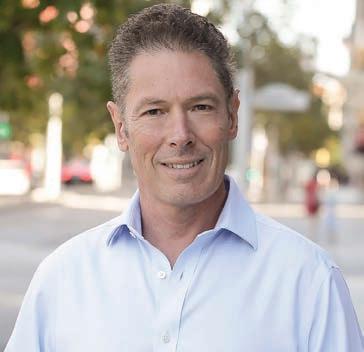Q&A with... Dr Andrew Miller, President of the Australian Medical Association (WA)
MF: Reflecting on the year just past, what have been the highlights for Dr Andrew Miller – both professionally and personally? AM: 2019 held some of my best and worst days. The arrival of our daughter Ava, in late 2018, has brought wonder and renewal, as only a baby can do. There is nothing like a fresh new person to motivate us to improve the world that she, and her adoring older siblings, will inherit. She won't remember though, that in her first few months she spent some short but wonderful time with my closest friend, fellow anaesthetist Andrew Olney, just before he died from renal cell carcinoma. How valuable he was. Such huge a loss can only be digested over a very long time, if at all. I can’t get his voice out of my head. though, so I still have his disrespectful advice on hand. My son graduated high school late in the year, deploying what could only be called an extremely healthy work-life balance, and my elder daughter continues to inspire with her adventurous approach to study and life. Being elected to the AMA (WA) Presidency was a great honour. I have high hopes for what the organisation can become, and what doctors can do, when our collective intellect is coordinated. I am so proud of this profession, when it is at its best, and I relish the opportunity to change things for the better and to point out all the good medicine has done and can do. Science must win out over whatever it is that is going on now with democracies and online information. MF: What were the most significant issues you had to face as AMA (WA) President in 2019? AM: The big-ticket items were: - the public health system perfect storm.
8 | FEBRUARY 2020
Sky rocketing demand rendering new facilities already too small, poor staff engagement, junior doctor leave and rosters, difficulty getting subacute patients placed, and mental health languishing. - general practice suffering chronic Canberritis Under-funding and bureaucracy, lack of training applicants, pharmacy nonsense, pathology rent issues. WAPHA leading on the Urgent Care pilot was a plus here, and WAGPET leading on Rural Generalist pathways. - voluntary assisted dying, palliative care, and the whole of end of life. - public health skirmishes Obesity, vaping, with chronic outbreaks of smoking, alcohol and gambling industry push back. Getting the balance between public policy and personal responsibility right. - internal renewal of the AMA (WA) to set it up for the next generations. MF: How did you and the organisation approach them? AM: I have refined my view of how the AMA can move forward after being on the state and federal Councils for some years, observing and learning from doctors whom I admire. I took time to see what works and what doesn’t. We need a laser-like focus on what doctors and their patients need from the AMA to make our lives easier and outcomes better. In 2017 I started a process of renewal at AMA (WA) and we changed the constitution then to have a professional board, modern governance, and to start a professional seamless transition to our new CEO. That has now been successfully delivered. In advocacy, actively soliciting
opinions of members and all doctors is the most effective way to represent the profession. Seeking and listening to the various opinions is vital to staying sensible. Though doctors take issue with some decisions, and that is inevitable, they do seem to appreciate the opportunity to be heard and treated with respect. MF: Do you measure the outcomes in terms of success, or in a more multi-dimensional way? AM: Outcomes are always multidimensional as the question suggests. Sophisticated analysis of any issue will reveal the level of priority, the stakeholders, the impact, and how it all interacts with culture and politics. Were we listened to? Was change made? How have doctors and patients been affected? It takes a while to find these things out, but we have to decide objectively if advocacy has resulted in improvement then try again. The AMA has to be both reactive and proactive and also agile enough to respond quickly when the issues arise. All this on a limited budget, which is why our businesses must also be run professionally to effectively support our underlying aims. MF: Assuming that Voluntary Assisted Dying was one of those issues, are you content with the outcome? AM: We aren't finished with that one yet, in the sense that the impending implementation of the Act has both risks and opportunities. However, we were listened to and we can now continue to discuss with doctors and represent the views of those who will be directly affected by its implementation. In many cases that will be Specialist GPs who provide a lot of end of life care. When there are disparate views
MEDICAL FORUM | INNOVATION & TRENDS ISSUE
BACK TO CONTENTS
Q&A

























